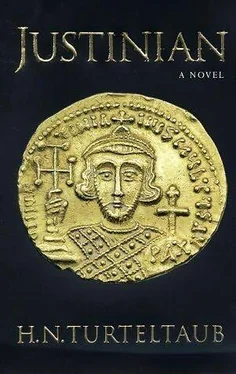Harry Turtledove - Justinian
Здесь есть возможность читать онлайн «Harry Turtledove - Justinian» весь текст электронной книги совершенно бесплатно (целиком полную версию без сокращений). В некоторых случаях можно слушать аудио, скачать через торрент в формате fb2 и присутствует краткое содержание. Жанр: Историческая проза, на английском языке. Описание произведения, (предисловие) а так же отзывы посетителей доступны на портале библиотеки ЛибКат.
- Название:Justinian
- Автор:
- Жанр:
- Год:неизвестен
- ISBN:нет данных
- Рейтинг книги:3 / 5. Голосов: 1
-
Избранное:Добавить в избранное
- Отзывы:
-
Ваша оценка:
- 60
- 1
- 2
- 3
- 4
- 5
Justinian: краткое содержание, описание и аннотация
Предлагаем к чтению аннотацию, описание, краткое содержание или предисловие (зависит от того, что написал сам автор книги «Justinian»). Если вы не нашли необходимую информацию о книге — напишите в комментариях, мы постараемся отыскать её.
Justinian — читать онлайн бесплатно полную книгу (весь текст) целиком
Ниже представлен текст книги, разбитый по страницам. Система сохранения места последней прочитанной страницы, позволяет с удобством читать онлайн бесплатно книгу «Justinian», без необходимости каждый раз заново искать на чём Вы остановились. Поставьте закладку, и сможете в любой момент перейти на страницу, на которой закончили чтение.
Интервал:
Закладка:
Theodora stared in some considerable dismay the first time he brought in a squid as long as his forearm. "You eat that?" she asked me incredulously. "It is not a proper fish. I do not like the way it stares at me, and I do not like all its-" She wiggled her fingers back and forth, lacking the proper word.
"Tentacles." I did my best to be helpful.
"Whatever they are." She made as if to push the squid away. But when, instead of seeing it whole, she ate slices of it fried in butter (a flavor I tolerated better than she did that of olive oil, to which she took years to become accustomed), she praised its delicate taste and grumbled only a little at its chewy texture. The cook bought more squid after that, and she ate them with good appetite. She did not, however, care to look at them before they were cooked. Nor does she even now, here on the day on which I set down these words.
Every time I saw Balgitzin after Moropaulos came to Phanagoria, I wondered whether the Khazar had yet received orders to make away with me. This was at first foolish, for I knew more about Apsimaros's effort against me than he did- unless, of course, the tudun at Kherson had sent him word at the same time as the fisherman came to me. I doubted that, Balgitzin remaining for some time cordial to me and not striking me as a man schooled in the art of dissembling.
And then one evening, having drunk myself cheerful if not sozzled at Phanagoria's finest tavern (a dubious commendation in such a limited field) along with Myakes, I discovered a squad of armed men- Khazars- outside the doorway to the house in which I and mine were living. They had not been there when the two of us left the place.
Myakes set a hand on my arm to hold me back, the Khazars having four or five presumably sober men to each of us. I shook him off and went straight up to them. "Any of you speak Greek?" I asked. When a couple of them nodded, I found the next logical question: "What's going on?"
They might have answered that question by drawing their swords, in which case I should not be scribbling now. One of the men who had shown he understood Greek answered, "Balgitzin say, you have Romans wanting to kill you. Is true?" It was my turn to nod; I could hardly deny it. The Khazar continued, "We are guards to you- for you- to be sure no Romans kill you."
"Oh," I said, and then, "Thank you very much." I could not object if Balgitzin set guards on me using such a pretext. For that matter, it might not have been a pretext: if Ibouzeros Gliabanos had rejected Apsimaros's request for my person or some significant fraction thereof, he would have reason to think the usurper might resort to more direct means of disposing of me. But if the khagan had decided to go along with the usurper, he gained a plausible excuse for placing warriors near me.
Which was it? I did not know. I could not know. I could only wait. I hated waiting. I had waited a decade for the slim chance I now had. How I hungered to slay them all! But they were many, and I had only faithful Myakes at my side. Suppose we did slay them? Balgitzin could summon soldiers without number. I could not.
I walked past them into the house. Myakes followed. The Khazars bowed to each of us in turn. I barred the door. That only made me feel more trapped, not more safe.
However much I desired to do so, the guards gave me no excuse to complain of their conduct to Balgitzin. When I stayed in the house to which the tudun of Phanagoria had assigned me, they remained outside. When I went out, one or two of them came along with me. I even found myself having trouble disliking them. They were but warriors, doing as they were ordered and doing it well.
No murderers with Apsimaros's gold in their belt pouches sprang out from behind a wall to try to slay me. Was that because the guards intimidated them or because they were not there? Again, how could I know?
A couple of weeks after Balgitzin gave me my armed guard, he invited Theodora and me to a feast at his residence that evening. "I thank you," I said. "What is the occasion?"
"A noble has come from the khagan's court at Atil to Phanagoria," he answered. "Of course you remember Papatzun."
"Of course," I lied. Back at Atil, one barbarian had seemed much like another. Those who did not speak Greek- which meant the large majority- might as well not have existed, as far as I was concerned.
But, as I had expected, my wife had no difficulty placing this Papatzun on my bringing her word of his arrival. She looked serious, saying, "This is a man my brother trusts."
"He has not come to Phanagoria now by chance, then?" I said.
"By chance?" Theodora frowned until she understood what I was driving at. "Oh. No. If anyone brings word from my brother to do this or not to do that, Papatzun is likely to be the one. I will learn from him what I can."
"Good." I kissed her, but then warned, "Don't let him know we suspect."
Amusement glinted in her dark, narrow eyes. "Do not fear about this. I will not ask him. I will not ask his friends, if any have come with him. I will ask his slaves. I know a couple of them well. They will tell me the truth."
I kissed her again. "I will not give you any more advice. You don't need it."
"You are my husband." She hesitated long enough to draw in a deep breath before going on, "You are my love. If I can help you, I will do it."
All I knew at that moment was gratitude. I may be reckoned unmanly for not disdaining a woman's help, but, considering how easily Theodora could have chosen the side of her brother and her tribe rather than mine, I knew how lucky I was in her. "You are my Empress, my Augusta, now," I said. "Soon you shall be my Empress in the Queen of Cities."
"God willing," she said once more, making the holy sign of the cross.
"As for the banquet," I said, "we shall see what we shall see."
On meeting Papatzun again, I discovered I did remember him after all: remember his face, at any rate, for we had not had much to say to each other, being largely without a common language. He was not very young, not very old, not very fat, not very thin, not very tall, not very short\a160… not very interesting. In Constantinople, I judged, he would have been a secretary in charge of some medium-sized bureau, a man doing a fairly large job well enough to avoid censure but not so well as to get himself promoted out of it.
In Constantinople, such quiet, competent men are common enough. No doubt being harder to come by in Khazaria, they must also have seemed more valuable than is the case within the boundaries of the Roman Empire. This rarity, I judge, accounted for the trust Ibouzeros Gliabanos reposed in Papatzun.
Khazar notions of banqueting require the celebrants to gorge themselves until they cannot move and drink until they cannot see. Having had my fill of fish, I ate beef and mutton. Perhaps having had his fill of beef and mutton, Papatzun ate mackerel, quite different from the sturgeon of Atil. He agreed with me in preferring wine to the drink his countrymen make from their mares' milk.
Despite Balgitzin's services as interpreter, Papatzun and I had little to say to each other. He was polite enough to me; I could no more fault his behavior than that of the guards with whom Balgitzin had saddled me. Every so often, I would glance over at him from the corner of my eye. Once or twice, I saw, or thought I saw, him glancing over at me in the same way. When that happened, each of us quickly looked away from the other.
Theodora, by contrast, enjoyed herself immensely. The banquet giving her the chance to speak her own language unmixed with Greek, she took full advantage of it, chatting animatedly with Balgitzin's wife (whose name I learned but have long since forgotten), taking part in the conversation of the men more freely than would have been reckoned proper at a Roman feast, and, by all appearances, enjoying her conversations with Balgitzin's and Papatzun's slaves as well.
Читать дальшеИнтервал:
Закладка:
Похожие книги на «Justinian»
Представляем Вашему вниманию похожие книги на «Justinian» списком для выбора. Мы отобрали схожую по названию и смыслу литературу в надежде предоставить читателям больше вариантов отыскать новые, интересные, ещё непрочитанные произведения.
Обсуждение, отзывы о книге «Justinian» и просто собственные мнения читателей. Оставьте ваши комментарии, напишите, что Вы думаете о произведении, его смысле или главных героях. Укажите что конкретно понравилось, а что нет, и почему Вы так считаете.












